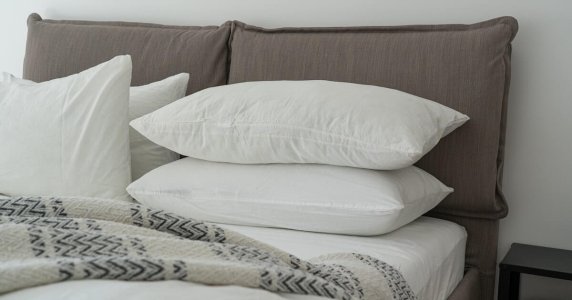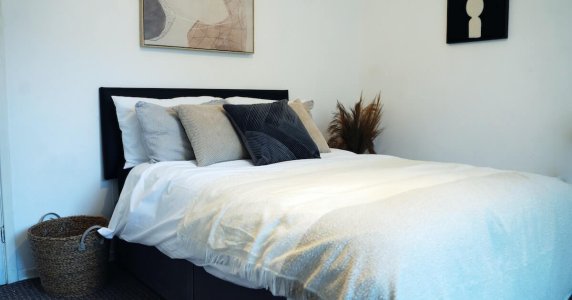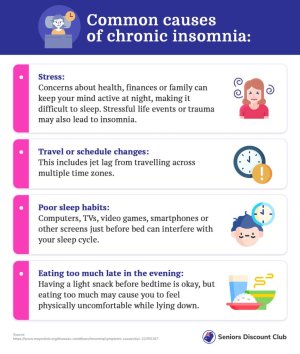Warning: Under 50 and can't sleep? Study finds insomnia symptoms could increase your stroke risk!
- Replies 0
Sleep is essential for our physical and mental well-being, and no matter our age, getting a good, well-rounded night’s rest should always be a top priority.
Without it, we are out of sync with our circadian rhythms. We become more open to health concerns, such as a weakened immune system, increased risk of diabetes, hypertension and, according to a new study, stroke.
According to the study, those experiencing multiple insomnia symptoms may have a higher risk of suffering a stroke, especially for people under 50 years old. An increased risk of stroke is usually seen in older adults with more health problems, according to the study.
The research followed over 31,000 people with no previous history of stroke for nine years, uncovering some alarming trends in the potential dangers of poor sleep quality.
According to the findings published in the journal Neurology, individuals who experienced five to eight symptoms of insomnia had a 51 per cent increased risk of stroke in comparison with those who did not suffer from insomnia. In contrast, people with one to four symptoms saw a 16 per cent increased risk of stroke.
The Mayo Clinic lists several symptoms of insomnia, which include: trouble falling asleep, waking up during the night, waking up too early in the morning, not feeling well-rested, daytime sleepiness, anxiety, depression and irritability, worrying about sleep, increased errors or accidents, and difficulty focusing, remembering or paying attention.
Lead study author and epidemiologist Wendemi Sawadogo emphasised the importance of addressing sleep issues to reduce stroke risk later in life.
‘There are many therapies that can help people improve the quality of their sleep.’
‘Determining which sleep problems lead to an increased risk of stroke may allow for earlier treatments or behavioural therapies for people who are having trouble sleeping, and possibly reducing their risk of stroke later in life,’ the researcher said.
The connection between sleep disorders and stroke is not new, and the perils of poor sleep extend beyond insomnia.
Similar research published in April, which analysed data from over 4,500 people, found that those who slept less than five hours a night were three times more likely to have a stroke than those who got the recommended seven hours of sleep.
On the other hand, excess sleep also proved risky – more than nine hours of sleep was associated with a twofold increase in stroke risk.
Sleep apnoea, a condition in which individuals stop breathing multiple times per hour, increases stroke risk threefold.
Snoring or snorting, both potential signs of untreated sleep apnoea, were also identified as risk factors. People who snored were 91 per cent more likely to have suffered a stroke, while those who snorted were almost three times as likely to have had a stroke than those who did not.
The study also had some unexpected findings, like the revelation that napping for over an hour could increase stroke risk by 88 per cent. However, a planned nap of under an hour was not associated with increased risk.
So, why are sleep issues connected with stroke? According to Dr Phyllis Zee, Director of the Center for Circadian and Sleep Medicine at Northwestern University's Feinberg School of Medicine, poor sleep can interfere with the body's ability to regulate metabolism, blood pressure, and inflammation – which are all factors that contribute to the risk of stroke.
‘Poor sleep can impair the natural blood pressure dipping that occurs during nighttime sleep and contribute to hypertension — an important risk factor for stroke and cardiovascular disease,’ the sleep expert explained.
Dr Andrew Freeman, Director of Cardiovascular Prevention and Wellness at National Jewish Health, recommended aiming for seven hours of uninterrupted sleep per night to minimise the risk of cardiovascular disease.
He also said that practising good sleep hygiene, maintaining a healthy diet, and incorporating regular exercise are essential components in combatting the potentially harmful impacts of sleep disorders and reducing the risk of stroke and cardiovascular disease.
So, members, make sure to take care of your sleep health. Remember, a well-rested body and mind are crucial to staying healthy no matter your age.

If necessary, seek medical advice and explore treatments that could help improve your sleep quality.
Do you maintain a regular sleep schedule? How do you do it? Share your tips with us in the comments below!
Without it, we are out of sync with our circadian rhythms. We become more open to health concerns, such as a weakened immune system, increased risk of diabetes, hypertension and, according to a new study, stroke.
According to the study, those experiencing multiple insomnia symptoms may have a higher risk of suffering a stroke, especially for people under 50 years old. An increased risk of stroke is usually seen in older adults with more health problems, according to the study.
The research followed over 31,000 people with no previous history of stroke for nine years, uncovering some alarming trends in the potential dangers of poor sleep quality.
According to the findings published in the journal Neurology, individuals who experienced five to eight symptoms of insomnia had a 51 per cent increased risk of stroke in comparison with those who did not suffer from insomnia. In contrast, people with one to four symptoms saw a 16 per cent increased risk of stroke.
The Mayo Clinic lists several symptoms of insomnia, which include: trouble falling asleep, waking up during the night, waking up too early in the morning, not feeling well-rested, daytime sleepiness, anxiety, depression and irritability, worrying about sleep, increased errors or accidents, and difficulty focusing, remembering or paying attention.
Lead study author and epidemiologist Wendemi Sawadogo emphasised the importance of addressing sleep issues to reduce stroke risk later in life.
‘There are many therapies that can help people improve the quality of their sleep.’
‘Determining which sleep problems lead to an increased risk of stroke may allow for earlier treatments or behavioural therapies for people who are having trouble sleeping, and possibly reducing their risk of stroke later in life,’ the researcher said.
The connection between sleep disorders and stroke is not new, and the perils of poor sleep extend beyond insomnia.
Similar research published in April, which analysed data from over 4,500 people, found that those who slept less than five hours a night were three times more likely to have a stroke than those who got the recommended seven hours of sleep.
On the other hand, excess sleep also proved risky – more than nine hours of sleep was associated with a twofold increase in stroke risk.
Sleep apnoea, a condition in which individuals stop breathing multiple times per hour, increases stroke risk threefold.
Snoring or snorting, both potential signs of untreated sleep apnoea, were also identified as risk factors. People who snored were 91 per cent more likely to have suffered a stroke, while those who snorted were almost three times as likely to have had a stroke than those who did not.
The study also had some unexpected findings, like the revelation that napping for over an hour could increase stroke risk by 88 per cent. However, a planned nap of under an hour was not associated with increased risk.
So, why are sleep issues connected with stroke? According to Dr Phyllis Zee, Director of the Center for Circadian and Sleep Medicine at Northwestern University's Feinberg School of Medicine, poor sleep can interfere with the body's ability to regulate metabolism, blood pressure, and inflammation – which are all factors that contribute to the risk of stroke.
‘Poor sleep can impair the natural blood pressure dipping that occurs during nighttime sleep and contribute to hypertension — an important risk factor for stroke and cardiovascular disease,’ the sleep expert explained.
Dr Andrew Freeman, Director of Cardiovascular Prevention and Wellness at National Jewish Health, recommended aiming for seven hours of uninterrupted sleep per night to minimise the risk of cardiovascular disease.
He also said that practising good sleep hygiene, maintaining a healthy diet, and incorporating regular exercise are essential components in combatting the potentially harmful impacts of sleep disorders and reducing the risk of stroke and cardiovascular disease.
So, members, make sure to take care of your sleep health. Remember, a well-rested body and mind are crucial to staying healthy no matter your age.
Key Takeaways
- Multiple insomnia symptoms can raise stroke risk in people under 50, according to a study following over 31,000 people with no history of stroke for nine years.
- Researchers found people with five to eight symptoms of insomnia had a 51 per cent increased risk of stroke compared with people who did not have insomnia.
- Sleep issues, poor sleep, and sleep apnoea can disrupt the body's ability to regulate metabolism, blood pressure, and inflammation, which are all risk factors for stroke.
- Practicing good sleep hygiene, eating a healthy diet, and getting regular exercise are key ways to reduce the negative impact of sleep disorders and reduce the risk of stroke and cardiovascular disease.
Do you maintain a regular sleep schedule? How do you do it? Share your tips with us in the comments below!










